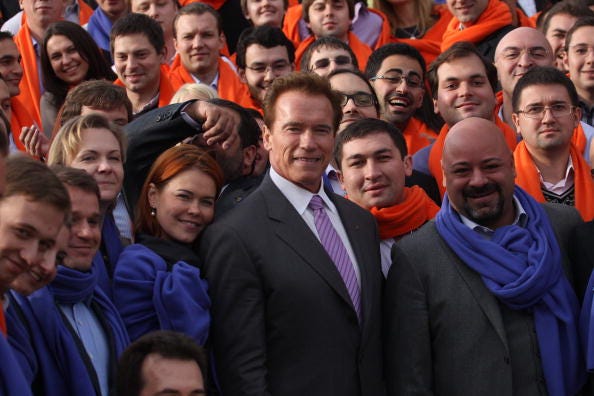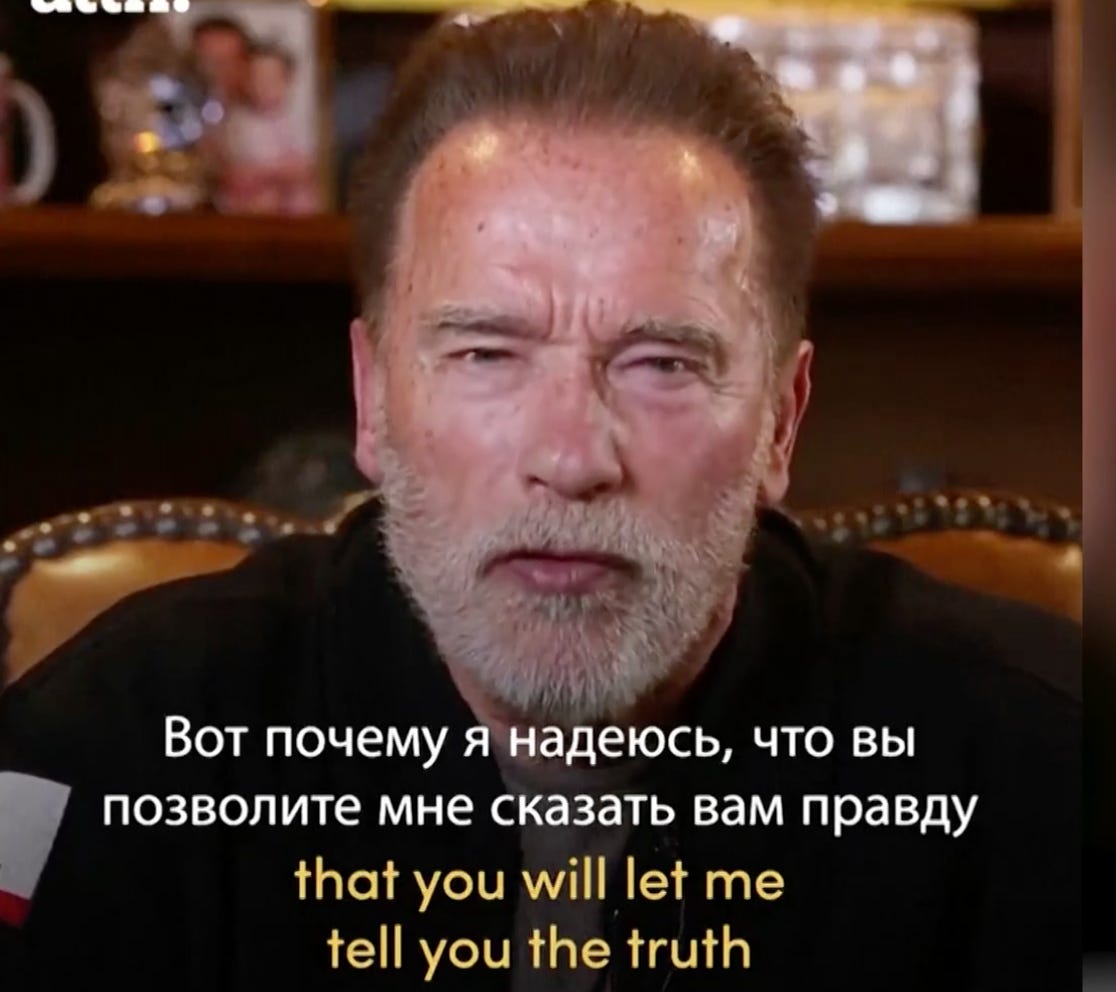Speaking Directly to Russians, Schwarzenegger Disrupts Putin's Disinformation Machine
He Uses Three Tactics to Reach People Whose Beliefs are Shaped by Propaganda
“I Have a Message for My Russian Friends,” former California Governor Arnold Schwarzenegger says in introducing the video about Russia’s invasion of Ukraine that he released on Twitter on March 17. “There are things going on in the world that have been kept from you, terrible things that you should know about. But before I tell you about the harsh realities, let me tell you about the Russian who became my hero.”
Russian President Vladimir Putin has taken extraordinary measures against foreign and Russian media to keep Russians from learning the truth about his war on Ukraine. Some younger Russians may use VPNs to access global media sites, but the majority of the population must rely on Kremlin propaganda narratives for information about the horrific attack.
That’s where Schwarzenegger’s message, addressed to Russian soldiers and civilians, comes in. Its touching directness and simple and heartfelt language have struck a chord in viewers. It has gone viral, including among users of Russian social media.
Yet there is a sophistication to the storytelling. Schwarzenegger uses counter-messaging techniques that have proved effective in reaching populations under the sway of authoritarian propaganda and leader cults.
Experts on disinformation and authoritarian cults concur that fear of being ridiculed, shamed, and judged for believing falsehoods can motivate people to cling to dogma, even in the face of growing evidence that what they’ve been told is untrue. If they have also embraced that dogma for years –as in Russia, where Putin has been in power for over two decades – they can be reluctant to admit to themselves and others that they have misplaced their trust.
That’s why it’s important that Schwarzenegger approaches his audience with respect and kindness. He calls out Kremlin propaganda (“I know that your government has told you this is a war to de-nazify Ukraine. This is not true. Ukraine did not start the war.” Or: “I regret to tell you that thousands of Russian soldiers have been killed.”) but he does not condescend to his viewers.
Rather he states his “affection and respect” for Russians at the outset, and offers his truth in that spirit. “No one like to hear something critical of their government. I understand that. But as a longtime friend of the Russian people, I hope that you will hear what I have to say.”
He also avoids taking a superior moral position as a U.S. citizen, since decades of Kremlin denunciations of the evils of American society would likely cause that to backfire. Instead, he emphasizes that, as an Austrian native whose father fought for the Nazis, he feels obligated to call out lies and violence wherever they occur: “I spoke to the American people this way last year on January 6....There are moments that are so wrong that we have to speak up.”
Unsurprisingly, some Russians noted this absence of judgment as a strong point of the video. The opposition politician Lev Schlosberg wrote on Telegram (a social media site popular with Russians) that it showed “respect towards us, Russian people.”
Schwarzenegger also shows compassion for Russians’ predicaments, placing responsibility for the war squarely on Putin rather than on the Russian people. He expresses care for them, rather than hostility. He does this, in part, by relating the toll a propaganda-fueled war took on his father, who lived in pain and guilt from his wartime experiences for years after Nazism’s fall. “I don’t want you to be broken like my father,” he says.
In this way, his video puts into practice the recommendations of BBC disinformation reporter Marianna Spring, cult expert Steven Hassan, and others. When engaging with those under the sway of disinformation, it’s best to express empathy, rather than be dismissive, and find areas of common experience.
That’s why the Russian journalist Anton Orekh appreciated the video: at the moment we Russians are outcasts in the eyes of the world, he wrote on Telegram, Schwarzenegger sees us “as good people who have lost their way[s].”
Schwarzenegger is admired by millions in Russia, a country he has visited many times. In 2014, Russia expert Fiona Hill even recommended that he be appointed U.S. ambassador to Russia, believing he would stand up to Putin.
Schwarzenegger is ideally suited to inform Russians about their compatriots who now struggle for freedom inside the country, presenting them in a positive light rather than as foreign agents or saboteurs.

That’s why he closes his message by honoring the thousands of Russians who are protesting the war, risking imprisonment and beatings. Over 13,000 Russians have been arrested in 140 cities since the war began. “The world has seen your bravery.…You are my new heroes,” he says.
Of course, Schwarzenegger is not alone in trying to cut through Kremlin propaganda. The Ukrainian government has set up the “Come Back From Ukraine Alive” hotline Russians can call to find information on friends and relatives now serving as Russian soldiers in Ukraine. The hotline received more than 6,000 calls from Feb. 24 to March 7. And the Squad 303 initiative arranges for anti-Putin text messages to be sent to Russian cellphones.
The history of authoritarianism suggests that it can be difficult to reach people whose identities have been formed by years of false beliefs. Yet forging a link with such people is often how the process of their disengagement from a reality formed by lies begins. There is too much at stake, for both Ukraine and Russia, not to try.





Schwarzenegger's message also has an emotional effect on those of us who oppose this war. It is so unfortunate that the only way to dissuade Putin the instigator from continuing this horror show is through the suffering of the Russian people. He has effectively used his own citizens as a human shield. I do wish there was another way.
It is as if Putin is saying to his people, "This is a case of mind over matter. I don't mind and you don't matter." Sadly, this is not a good time to be Russian.
I watched the vid when it was first released and immediately reacted to the power of the delivery and the message. Schwarzenegger uses truth and empathy as well as a casual, nonthreatening style in a very effective manner. This is a chat with a friend, someone you worry and care about, someone who has lost their way through no fault of their own. It's a plea to come home, a plea to come back to the family of men and women who seek peace and mutual respect in the world.
I agree this manner of outreach may serve Americans in touching base with family and friends, those who have succumbed to far-right propaganda. So easy to become frustrated and angry with little to show for our efforts beyond more anger and frustration.
Been there, done that.
Kudos to Schwarzenegger for showing us a different way. Well done!